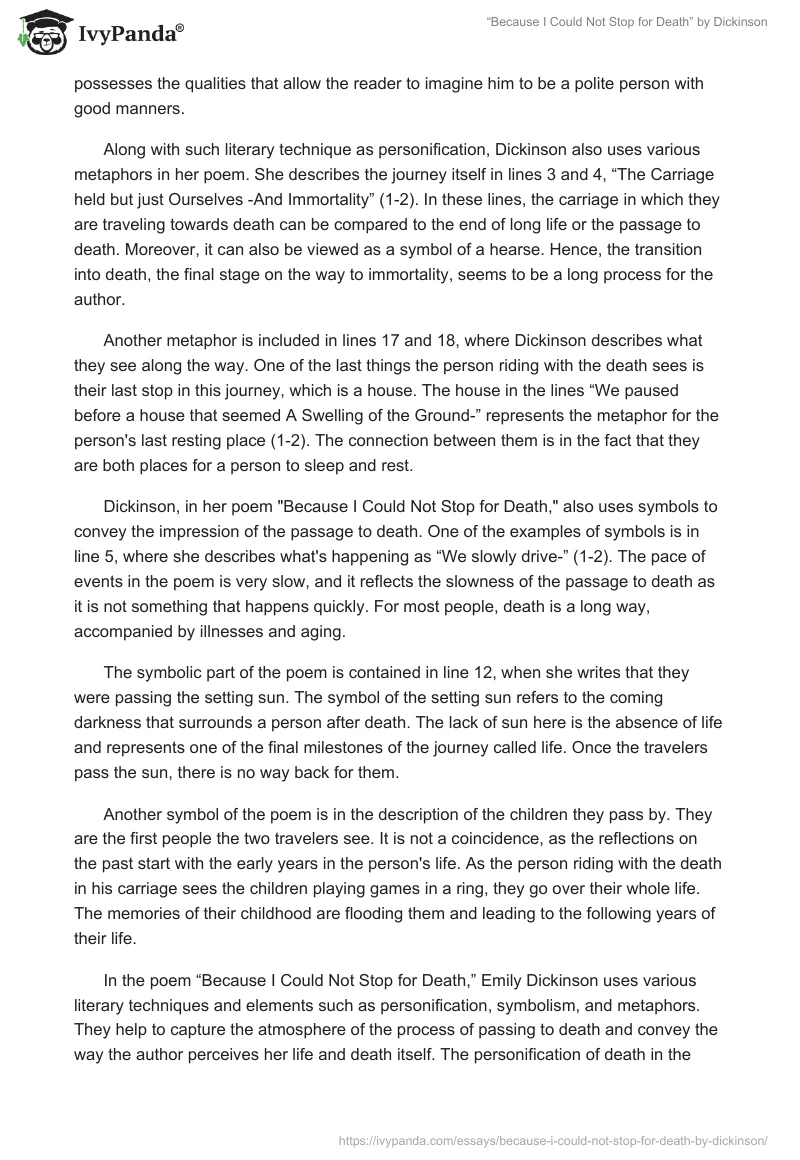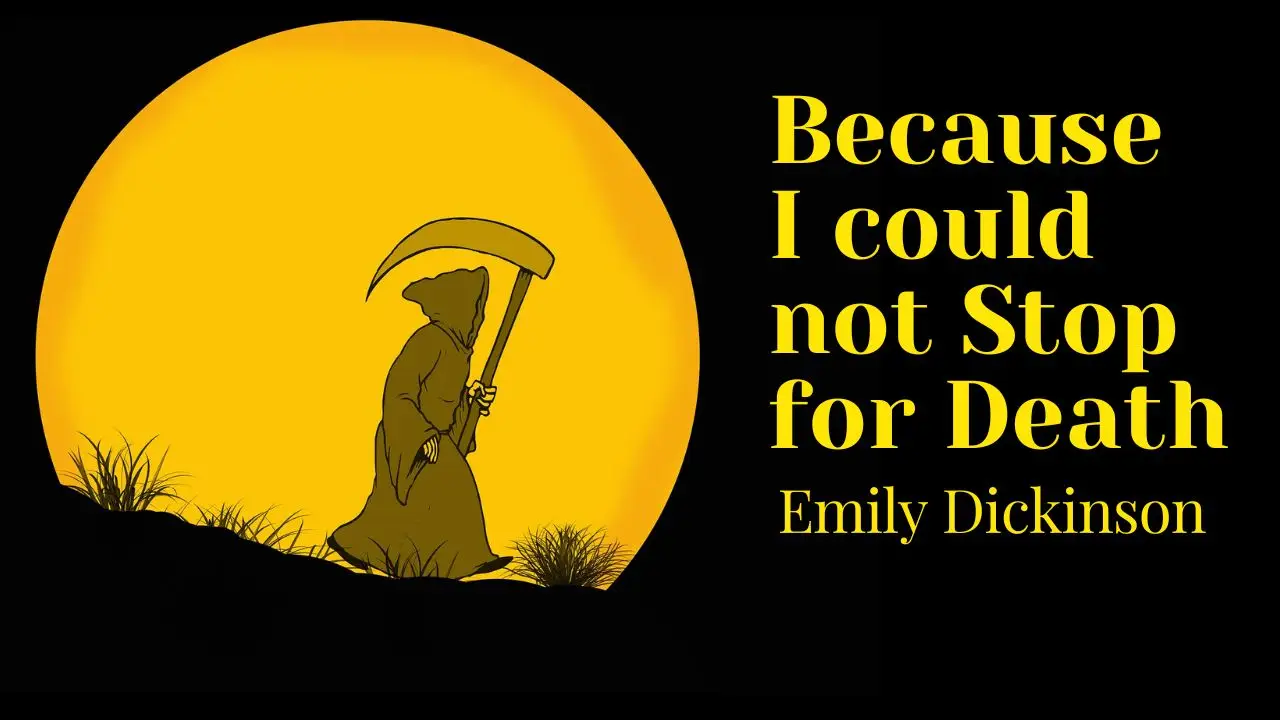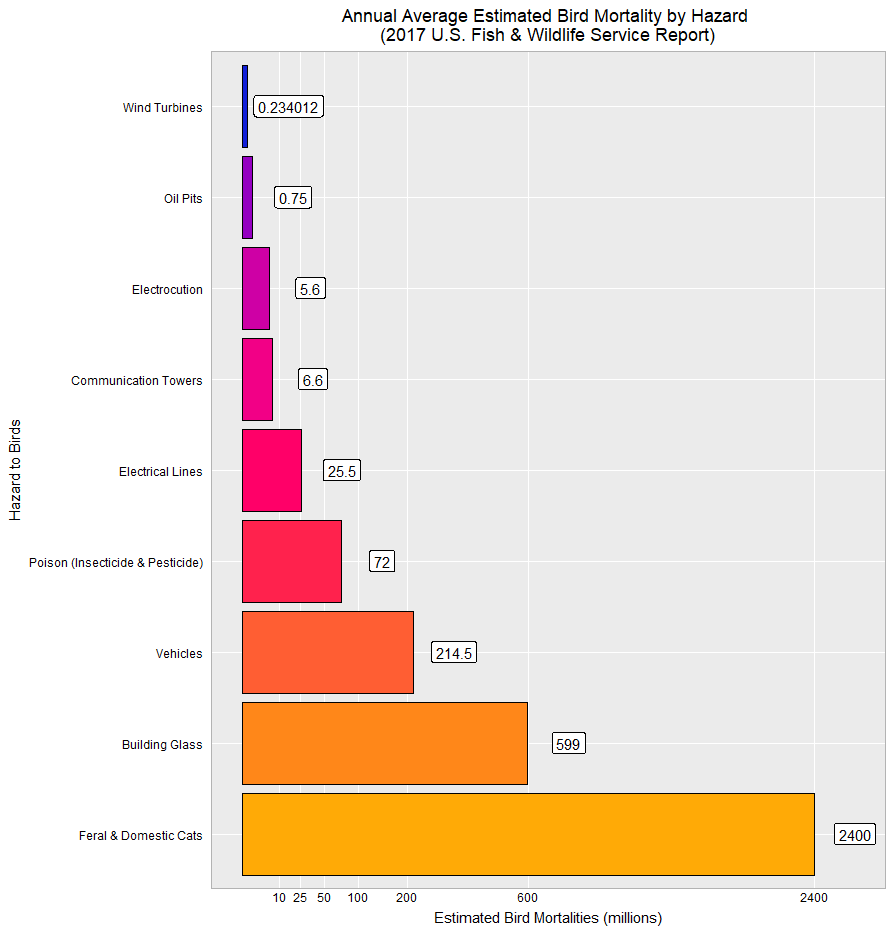Nov 11, 2023This is a six-stanza poem with full rhyme and slant rhyme, and in typical Emily Dickinson fashion, it is full of dashes between and at the end of lines. Her subject choice, death, is dealt with in an odd, imaginative way. The poet takes the reader on a mysterious journey through time and into a world beyond time.
Travis McKenzie
Jul 22, 2022Francis Bacon once said, “It is natural to die to become born.” “Because I Could Not Stop for Death” by Emily Dickinson is a lyrical poem that follows the speaker’s adventure into her life and eventually into her resting place toward eternity. Moreover, “Do not go gentle into that good night” by Dylan Thomas’s a poem that touches on defying

Source Image: ivypanda.com
Download Image
To the poet, ” Because I Could Not Stop For Death ” is one of the most admired poems on death. This poem contains Emily Dickinson ‘s meditation on death and immortality. Death is personified and is regarded as a suitor escorting his beloved. The greatest charm of the poem is in its ambiguity and the elusive nature of the significance of

Source Image: theliterarymaven.com
Download Image
Because I Could Not Stop for Death” by Emily Dickinson | Free Essay Example Summary. Emily Dickinson’s “Because I could not stop for Death—” (1863) is one of her most iconic poems. The six-stanza ballad tells of the speaker’s carriage ride with Death, which is

Source Image: tychr.com
Download Image
Because I Could Not Stop For Death Analysis Essay
Summary. Emily Dickinson’s “Because I could not stop for Death—” (1863) is one of her most iconic poems. The six-stanza ballad tells of the speaker’s carriage ride with Death, which is Briefly paraphrase the poem “Because I could not stop for Death.” With a paraphrase, one is striving to put a text into one’s own words. A paraphrase is generally not shorter, by much, than the
Because I Could Not Stop for Death Analysis: Emily Dickinson’s Poetic Journey – TYCHR
The first stage of revelation in the poem is the two opening lines; “Because I could not stop for death…He kindly stopped for me” (Mays 839). These lines simply indicate how death works. Even though nobody expects it, death will be kind enough to pick a person up whenever and wherever. These opening lines introduce the readers to the poet There’s no equality without educational equity: A lesson from “Animal Farm”

Source Image: weedutap.com
Download Image
The Death of a Gun-Rights Warrior – The Atlantic The first stage of revelation in the poem is the two opening lines; “Because I could not stop for death…He kindly stopped for me” (Mays 839). These lines simply indicate how death works. Even though nobody expects it, death will be kind enough to pick a person up whenever and wherever. These opening lines introduce the readers to the poet

Source Image: theatlantic.com
Download Image
Travis McKenzie Nov 11, 2023This is a six-stanza poem with full rhyme and slant rhyme, and in typical Emily Dickinson fashion, it is full of dashes between and at the end of lines. Her subject choice, death, is dealt with in an odd, imaginative way. The poet takes the reader on a mysterious journey through time and into a world beyond time.

Source Image: facebook.com
Download Image
Because I Could Not Stop for Death” by Emily Dickinson | Free Essay Example To the poet, ” Because I Could Not Stop For Death ” is one of the most admired poems on death. This poem contains Emily Dickinson ‘s meditation on death and immortality. Death is personified and is regarded as a suitor escorting his beloved. The greatest charm of the poem is in its ambiguity and the elusive nature of the significance of

Source Image: studycorgi.com
Download Image
Because I Could Not Stop For Death: A Near Death Experience Literary Yog Aug 30, 2022The famous poem of Emily Dickinson “Because I could not stop for Death” was published after her death in 1890. Because I could not stop for death is the great master piece of American’s poetry and famous poem of the Emily Dickinson. In the poem, a women tell a story about her. In this poem speaker tells from beyond the grave, telling her

Source Image: literaryyog.com
Download Image
Human-related Causes of Bird Mortality – Sibley Guides Summary. Emily Dickinson’s “Because I could not stop for Death—” (1863) is one of her most iconic poems. The six-stanza ballad tells of the speaker’s carriage ride with Death, which is

Source Image: sibleyguides.com
Download Image
Because I Could Not Stop for Death – Emily Dickinson – Poetry: The Best Words in the Best Order – #Blogchatter A2Z Challenge – Deep Ties Briefly paraphrase the poem “Because I could not stop for Death.” With a paraphrase, one is striving to put a text into one’s own words. A paraphrase is generally not shorter, by much, than the

Source Image: deepties.blogspot.com
Download Image
The Death of a Gun-Rights Warrior – The Atlantic
Because I Could Not Stop for Death – Emily Dickinson – Poetry: The Best Words in the Best Order – #Blogchatter A2Z Challenge – Deep Ties Jul 22, 2022Francis Bacon once said, “It is natural to die to become born.” “Because I Could Not Stop for Death” by Emily Dickinson is a lyrical poem that follows the speaker’s adventure into her life and eventually into her resting place toward eternity. Moreover, “Do not go gentle into that good night” by Dylan Thomas’s a poem that touches on defying
Because I Could Not Stop for Death” by Emily Dickinson | Free Essay Example Human-related Causes of Bird Mortality – Sibley Guides Aug 30, 2022The famous poem of Emily Dickinson “Because I could not stop for Death” was published after her death in 1890. Because I could not stop for death is the great master piece of American’s poetry and famous poem of the Emily Dickinson. In the poem, a women tell a story about her. In this poem speaker tells from beyond the grave, telling her